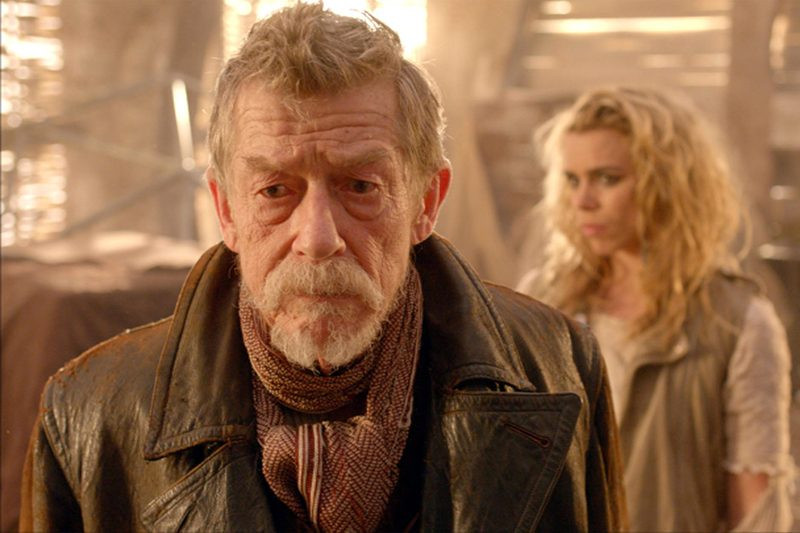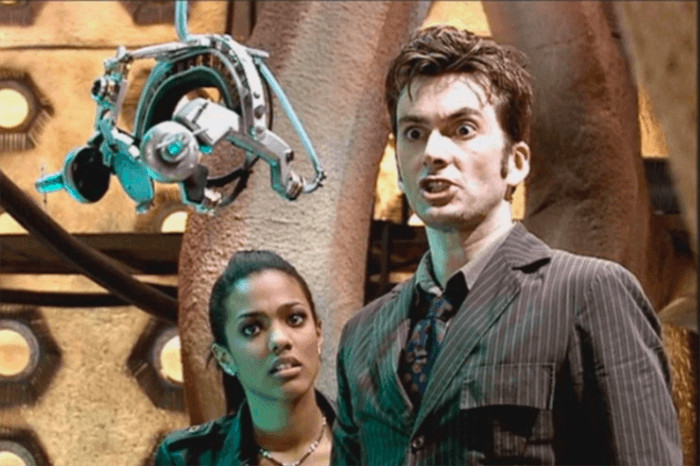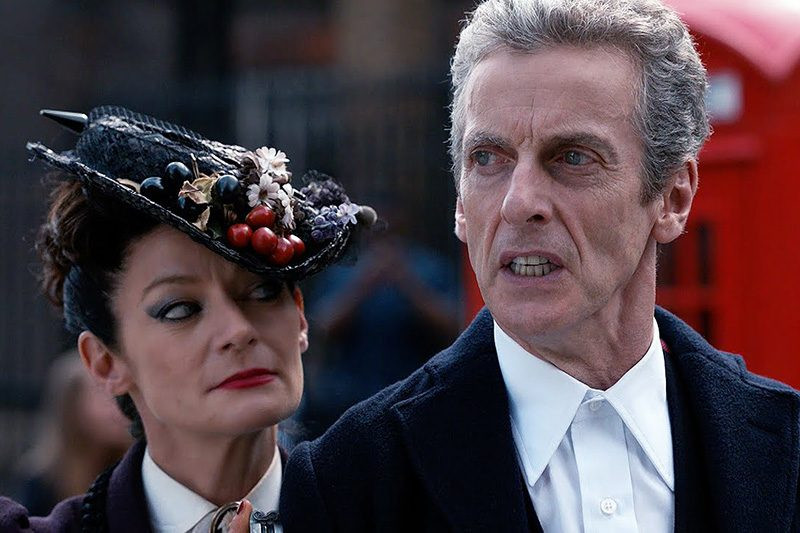The question of the Doctor’s real name is one of the longest-running mysteries in science fiction. For decades, fans have speculated, debated, and theorized about what moniker the enigmatic Time Lord from Gallifrey truly goes by. But if it isn’t Basil, or simply ‘Doctor Who,’ then what is Doctor Who’s real name? The truth is, the Doctor himself seems determined to keep it a secret, adding layers of intrigue to his already complex persona. Let’s delve into the evidence, hints, and theories surrounding this enduring enigma.
The Doctor’s reluctance to reveal his name is palpable throughout the series. When the Tenth Doctor, portrayed by David Tennant, first encountered River Song, her knowledge of his name sent shockwaves through him. He declared there was “only one reason” he would ever share such intimate information. Many believe this reason to be profound intimacy, perhaps even marriage, given the setting of their eventual wedding ceremony where the Eleventh Doctor, Matt Smith, supposedly whispered his name into her ear. However, in typical Time Lord fashion, ambiguity reigns supreme. Was it his real name, a secret code, or even a playful deception like, “Don’t worry, I’m actually a robot version of me with the tiny real me hiding inside”? Time Lord weddings, much like Time Lord names, are notoriously complicated.
 John Hurt as The War Doctor
John Hurt as The War Doctor
Around the same era, the Carrionite witch Lilith claimed the Doctor was concealing his true name from her “in despair,” while the psychic Roman teenager Evelina sensed his “true name” was “hidden” even from her considerable abilities. These pronouncements only deepened the mystery, suggesting a profound significance attached to the Doctor’s hidden identity.
As the Doctor regenerated into his eleventh incarnation, the secrecy surrounding his name became almost a central plot point. Dorium Maldovar famously declared the riddle, ‘Doctor Who?‘, as “The question that must never be answered.” Powerful entities like the Great Intelligence sought this information, while the sinister Silence, a cult-like organization, was founded with the express purpose of preventing the Doctor from ever uttering it aloud.
In the dramatic climax of the Eleventh Doctor’s era, it was revealed that the Doctor’s real name was intended as the signal for the Time Lords’ return to our universe. This revelation ignited a massive galactic conflict, only defused when Clara Oswald cleverly persuaded the Time Lords that ‘the Doctor’ was the only name that truly mattered. A powerful sentiment, indeed.
Clara herself had a fleeting glimpse of the Doctor’s real name within the pages of The History of the Time War, a book as elusive in reality as it is in fiction. Alas, timey-wimey interference erased this knowledge from her memory, leaving the audience as clueless as ever.
The introduction of the Timeless Child arc with Jodie Whittaker’s Thirteenth Doctor further muddies the waters. Now, there’s a very real possibility that even the Doctor is unaware of their original birth name, given the revelations about their pre-Time Lord origins. Could this mystery be any more convoluted?
Despite the Doctor’s explicit wishes and the potential cosmic ramifications, let’s boldly explore some prominent theories about what the Doctor’s real name might actually be.
Is “The Doctor” Actually His Real Name?
Firstly, we must consider the seemingly simplest possibility: could “the Doctor” be his actual given name? Perhaps it’s as commonplace on Gallifrey as “Chris” or “Alex” is on Earth.
However, compelling evidence suggests otherwise. In “The Name of the Doctor,” the Eleventh Doctor explicitly tells Clara that he chose the name ‘the Doctor’ as a solemn promise. This promise encapsulated his core values: to be neither cruel nor cowardly, to never give up, and to never surrender. Notably, during the Time War, he abandoned the title, feeling his actions in that brutal conflict betrayed the very essence of that promise.
The Valeyard, a morally ambiguous amalgamation of the Doctor’s darker potential, reinforces the notion that “the Doctor” is an alias, a chosen identity. Even the Master, in his characteristic mocking style, derides the Doctor for presenting himself as “the man who makes people better.”
Yet, in a fascinating twist, River Song offers a contrasting perspective. She posits that we derive the word “Doctor” from him. According to River, “Doctor” became the universal term for “healer and wise man” throughout the cosmos, inspired by tales of the Doctor’s legendary exploits. This intriguing idea, as RadioTimes.com noted, was first casually proposed by Steven Moffat in an online chat forum two decades prior.
Adding to the layers of meaning, the Doctor does appear to hold legitimate doctoral degrees, including a somewhat whimsical doctorate in cheese-making, as revealed in “The God Complex” (though the canonicity of a cheese doctorate remains open to interpretation).
The Familiar Alias: John Smith
 David Tennant and Freema Agyeman in Doctor Who (BBC)
David Tennant and Freema Agyeman in Doctor Who (BBC)
Beyond “the Doctor,” “John Smith” is arguably his most frequently used alias, particularly on Earth. Jon Pertwee’s Third Doctor adopted it extensively during his exile on Earth in the 1970s (or was it the 80s, time can be wibbly-wobbly), and the moniker persists even in later incarnations. The Twelfth Doctor, Peter Capaldi, utilized it during his “deep cover” stint as a caretaker at Coal Hill School. In a dramatic turn, the Tenth Doctor even physically became John Smith, shedding his Time Lord identity to evade the relentless Family of Blood. Adding a touch of bureaucratic humor, “John Smith” is also the name emblazoned on the Doctor’s (likely forged) library card – a detail that raises questions about Time Lord forgery skills and intergalactic library regulations.
Theta Sigma: A Gallifreyan Nickname?
“Theta Sigma,” or ΘΣ for those who prefer Greek lettering, emerges as a potential clue from the Doctor’s Time Lord Academy days on Gallifrey. Drax, a contemporary from “the class of ’92” (a humorous anachronism in itself), reintroduced this nickname when he encountered the Fourth Doctor in “The Armageddon Factor.”
It’s speculated that writer Anthony Read, who created Drax, might have intended “Theta Sigma” as a genuine, albeit subtly revealed, answer to the series’ central question. However, this idea was largely dismissed by fans and later writers, who embraced it as a lighthearted nickname. The Seventh Doctor, Sylvester McCoy, even confirmed its nickname status in “The Happiness Patrol.”
Despite its likely non-canonical nature as a real name, “Theta Sigma” sparks curiosity. Could it be derived from or related to his actual name? Nicknames often have roots in real names, even if playfully distorted.
Intriguingly, The Making of Doctor Who, a 1972 reference guide penned by then-script editor Terrance Dicks and writer Malcolm Hulke, casually declared the Doctor’s real name as δ³Σx². “Theta Sigma” could be interpreted as a simplified, pronounceable, and perhaps more humorous variation of this complex-looking name. (Whether δ³Σx² holds any deeper meaning or is simply technobabble remains, appropriately, another mystery.)
Names Given by Enemies: Titles of Fear?
 Matt Smith in Doctor Who (BBC)
Matt Smith in Doctor Who (BBC)
Throughout his travels, the Doctor has accumulated a collection of intimidating titles bestowed upon him by his adversaries: “The Oncoming Storm,” “The Beast,” “Predator of the Daleks,” “The Great Exterminator,” “Destroyer of Worlds,” and many more. These names, while not his given name, reflect the fear and respect (or perhaps begrudging respect) he commands among his enemies. They are titles earned through action, representing his formidable reputation across the universe. While undeniably cool, these are certainly not the name on his Gallifreyan birth certificate (if such a thing even exists). Perhaps if his enemies truly wanted to unsettle him, they should opt for something less dramatic, like “Custard Face.”
An Unpronounceable Truth?
The Sixth Doctor, Colin Baker, once cryptically informed Peri Brown that her human vocal cords were simply incapable of pronouncing his real name. Given this exchange occurred during a radio drama, its canonicity is often debated. Furthermore, the Sixth Doctor was known for his abrasive personality and less-than-charitable views on humanity, particularly Americans, so this could have been dismissed as mere rudeness.
However, Peter Capaldi’s Twelfth Doctor, in his poignant final moments, echoed a similar sentiment. He suggested his name was largely incomprehensible, except perhaps to a child with a pure heart. This repetition across different incarnations lends weight to the theory that the Doctor’s real name might indeed be beyond human comprehension, or at least, beyond easy pronunciation. Perhaps the Sixth Doctor wasn’t just being rude after all.
Doctor Who: Hidden in Plain Sight?
Finally, we arrive at the most meta and perhaps most intriguing theory: could the Doctor’s real name actually be… Doctor Who? The evidence, surprisingly, is more compelling than one might initially assume.
As far back as the 1966 William Hartnell serial, “The War Machines,” the supercomputer Wotan declared, “Doctor Who is required, bring him here.” While the in-universe explanation might be Wotan simply misinterpreting the Doctor’s chosen title as his name, the behind-the-scenes reality is likely simpler: the writer might have just missed the memo about the show’s premise. Regardless of the production oversight, this line entered the Doctor Who lexicon and became a point of fan speculation.
Wotan’s statement isn’t an isolated incident. In the Patrick Troughton era, the Second Doctor, while undercover as a German, adopted the alias “Doctor von Wer” (Doctor of Who). He even signed a message “Dr W.” These instances, while potentially coincidental or humorous, contribute to the ongoing ambiguity.
And then there are the countless “Doctor? Doctor who?” gags peppered throughout the series, winking at the audience and blurring the lines between title and name. Dorium Maldovar’s ominous warning takes on a new dimension in this context: “The first question. The question that must never be answered, hidden in plain sight. The question you’ve been running from all your life. Doctor who? Doctor who? Doctor who?”
Hidden in plain sight. What could be more hidden in plain sight than the very name of the show itself, emblazoned on every episode title sequence? It’s almost too obvious to consider, yet that very obviousness might be the point.
 Peter Capaldi and Michelle Gomez in Doctor Who (BBC, HF)
Peter Capaldi and Michelle Gomez in Doctor Who (BBC, HF)
Michelle Gomez’s Missy, in her chaotic and insightful way, actively promoted this theory. During a training exercise in “World Enough and Time,” she declared herself “Doctor Who” and later insisted it was his real name. “He chose it himself, trying to sound mysterious,” she explained, “And then he dropped the ‘Who’ when he realised it was a tiny bit on the nose.”
Even the Doctor himself, in that same scene, doesn’t explicitly deny it. “You see this mad woman sitting in this chair? Her name is not Doctor Who, my name is Doctor Who.” When Nardole questions, “It’s not, is it?” the Doctor simply replies, “I like it.”
Perhaps, in the grand tapestry of Doctor Who lore, the most fitting answer to “what is Doctor Who’s real name” is simply “Doctor Who.” Given the revelations of “The Timeless Children,” suggesting even the Doctor is uncertain of their true origins, embracing the chosen name “Doctor Who” feels narratively resonant. Steven Moffat himself seems to appreciate this meta-concept, hinting at its appeal.
Ultimately, the Doctor’s real name remains shrouded in mystery, possibly intentionally so. Whether it’s an unpronounceable Gallifreyan word, a forgotten birth name lost to time, or simply “Doctor Who” hiding in plain sight, the enigma is a core part of the Doctor’s enduring appeal. And perhaps, some questions are best left unanswered, allowing the mystery to continue to intrigue and captivate fans for generations to come.
This article was previously published in 2017.
Doctor Who is available to stream on BBC iPlayer with episodes of the classic series also available on BritBox – you can sign up for a 7-day free trial here.
For more, check out our dedicated Sci-Fi page or our full TV Guide and Streaming Guide.
Ad
Try Radio Times magazine today and get 12 issues for only £1 with delivery to your home – subscribe now. For more from the biggest stars in TV, listen to The Radio Times Podcast.
